When pursuing a career in endoscopy nursing, you must be prepared to answer interview questions that allow the interviewer to better understand your experience, skills, and personal qualities.
Whether you are an experienced endoscopy nurse or a certified one, ensuring you ace the interview is the best way to land your dream job.
Endoscopy Nursing Interview Questions and Answers
Below are common interview questions you might get asked in an interview for an endoscopy nursing job.
If you’re looking for endoscopy nursing jobs (or any jobs), check out the job board.
1. What inspired you to become an endoscopy nurse?
Answer:
“After nursing school, I got placed in an endoscopy unit.
I was impressed by how the senior nurses in my unit cared about patients and made them feel comfortable during the screening process.
I wanted to become just like those senior nurses and learn all I could from them.
Now, I feel passionate about the endoscopy specialty and want to further my career in this discipline.”
Endoscopy nursing demands a high level of empathy from the nurse.
These patients are nervous about what the endoscopy results will show and unsure how they will cope with illness.
An excellent endoscopy nurse will treat their job with attention and want to help their patients cope with whatever the outcome is.
Therefore, interviewers will look for candidates who display these qualities and treat endoscopy nursing as more than “just a job.”
2. What do you think is the most important quality of an endoscopy nurse?
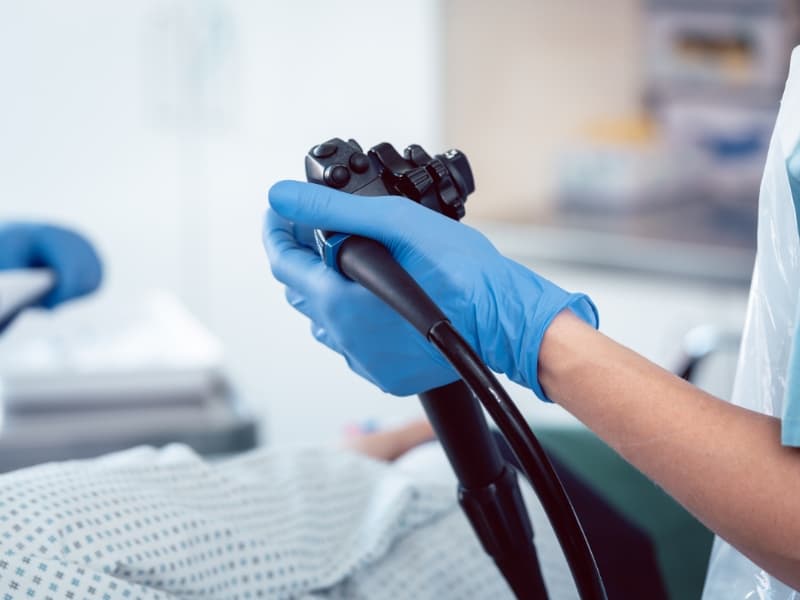
Answer:
“I feel that endoscopic nurses should be passionate about helping people and be able to work with the technology and equipment used during screening procedures.
The endoscopy field is improving quickly, and the nurse needs to keep up with all the latest technological developments.”
To be a successful endoscopic nurse, the candidate should be diligent and empathetic.
The interviewer is looking for you to mention those two qualities in your answer to assure them that you are the person who will be successful in an endoscopy unit.
3. How do you keep your knowledge about the endoscopy field current?
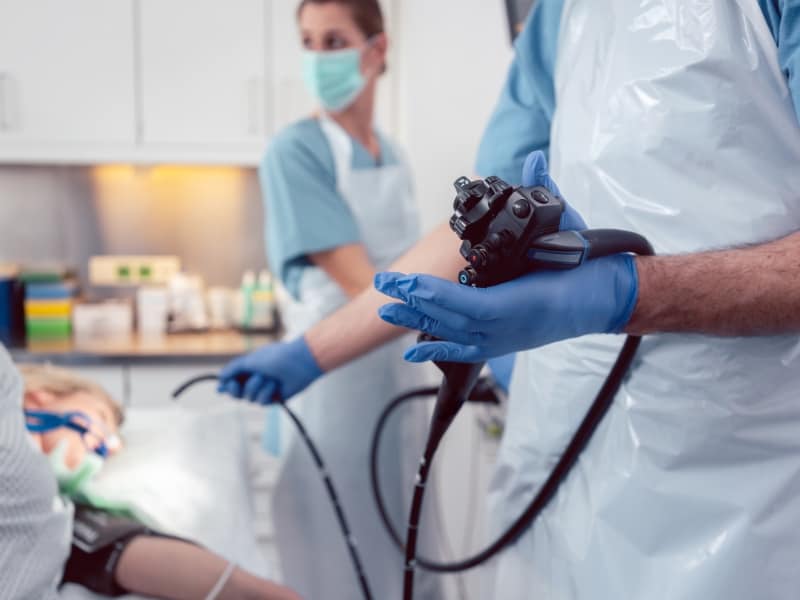
Answer:
“In my spare time, I read medical journal articles to ensure I have the latest information about endoscopic procedures.
Last year, I was lucky to be a part of the team our hospital sent to attend an endoscopy conference.
I feel that my knowledge is current, and I am familiar with all the latest endoscopic systems used by most gastroenterologists.”
Endoscopy procedures involve using flexible cameras, video equipment, and recording equipment for diagnostic and curative procedures.
As medical technology improves, nurses must upskill to the latest knowledge about the various endoscopic procedures.
The ideal candidate will have an up-to-date knowledge of the latest developments in the endoscopic field that they can gather through reading medical literature and attending conferences.
4. What strategies do you use to manage an uncooperative patient during the procedure?
Answer:
“When a patient becomes distressed during the procedure, they must keep still to prevent injury or camera damage that may occur if the patient suddenly starts to move.
That is why I always pay careful attention to the patient’s level of awareness during the procedure and give additional sedation medication when necessary if they start feeling pain.
I talk to them, reassure them that the procedure is going smoothly, and calm them down.”
The interviewer wants to determine that you can use excellent communication skills and provide proper care for a patient undergoing endoscopic examination.
The interviewer wants to see that you know how to calm a distressed patient and know about effective sedation during the examination.
5. Why are you leaving your current position?
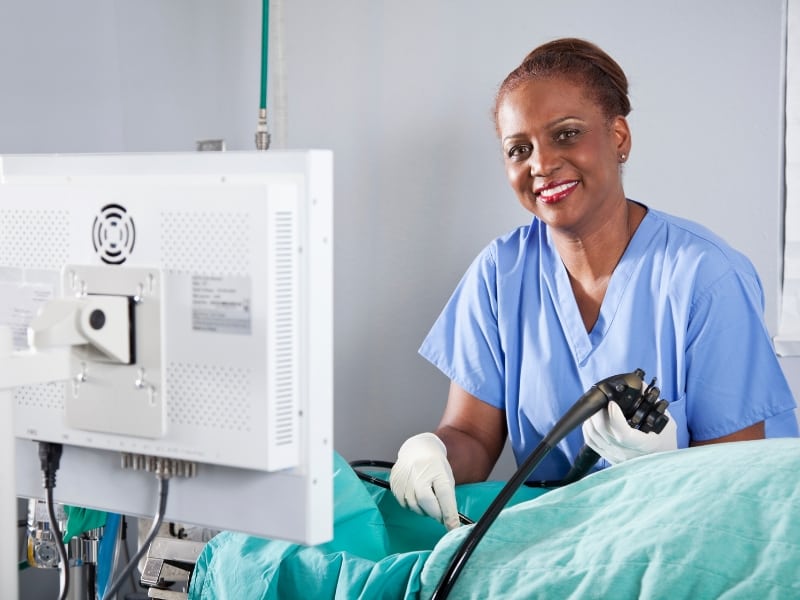
Answer:
“Even though I am happy in my current position, I am looking to grow my career, and I feel that I am now ready to accept more responsibilities in my work.
I have learned a lot from my present co-workers, and I feel it is time to expand my knowledge by joining another team of endoscopic nurses.”
The interviewer needs to find out why you have decided to change jobs.
Even when you are unhappy in your current job, remember that when you answer this question, you do not talk badly about your current facility or co-workers.
Keep your answer positive and always express a desire to learn more or to advance your career as a reason for leaving your current position.
6. Why did you choose our hospital to work for?
Answer:
“I heard your hospital upgraded your endoscopic unit with the latest equipment.
Working here will support my personal development and meet my career goals.
I also feel that I am ready for more responsibility, and how your unit is structured lets each endoscopic nurse take more responsibility for individual treatment plans of their patients.”
The way you answer this question shows the interviewer what interests you about the advertised position and how you view the facility.
Your answer should be honest and relate to how hiring you will benefit the hospital.
7. Where do you see yourself in five years?
Answer:
“In five years, I obviously want to gain more experience and learn all the latest surgical techniques by working in the unit.
I also want to specialize in gastroenterology by studying part-time for the certification course.
Once I have my qualifications, I would like to apply for the gastroenterology unit manager’s position when one becomes available.”
Employers are looking to fill their positions with people with well-planned career paths who are prepared to stay with the company for at least five years.
It is expensive to replace staff continually, so this is an important question to answer well. At the same time, you need to be honest and not make your employer any promises you cannot keep.
8. How would you prepare a patient who is to undergo an endoscopic procedure?
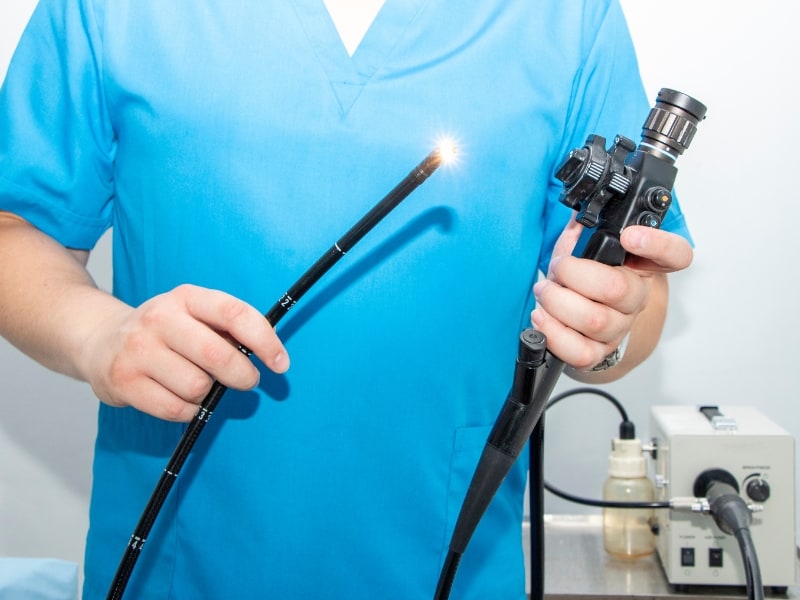
Answer:
“First, I usually greet the patient and introduce myself. I chat with them briefly to put them at ease and ask if they have any questions about the procedure.
Then I proceed with physical examination and finally administer sedative and pain medication to keep patient calm and pain-free during the procedure.”
The interview is a chance for the prospective employer to gauge your practical skills and abilities.
You can expect a couple of questions relating to how you work. When answering, describe the specific processes or steps of a procedure.
9. Tell me about the time you had to help the doctor with the procedure.
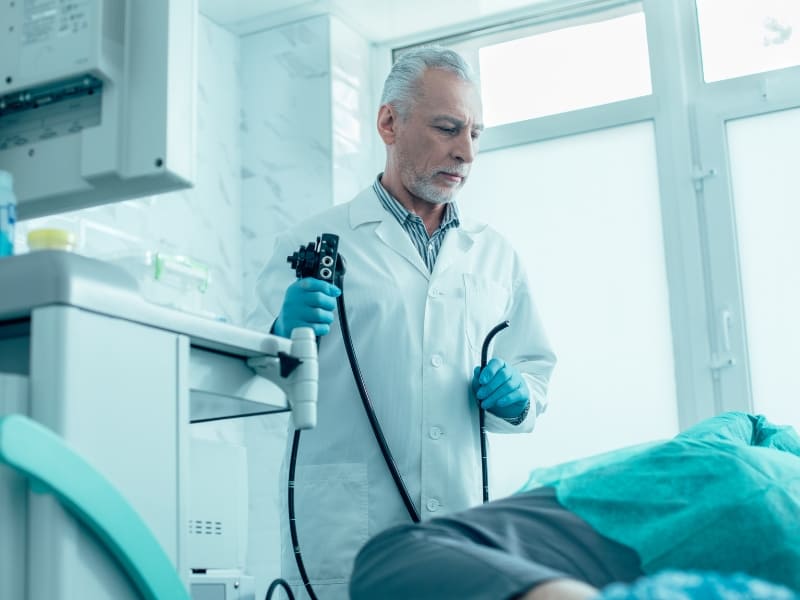
Answer:
“I had to help a doctor once during the colonoscopy because he was struggling to access a part of the colon because a tumor had almost obstructed the patient’s colon.
I had to help him guide the scope past the tumor to access the proximal part of the intestines. I followed his instructions on when to push the scope forward and when to spray water to improve the visibility.
We eventually managed to maneuver past the tumor, and the procedure was completed effectively.
Afterward, the surgeon thanked me for my help. He also took the time to answer a lot of questions I had, and I feel I have learned a lot more about endoscopic procedures that day.”
This question will help the interviewer determine how you work with co-workers and medical professionals.
It will also provide information about the way you communicate. To answer this question, use any examples from your experience where you helped a doctor or a co-worker.
In your answer, include all the steps you took and mention how your work helped a patient or improved their outcomes.
10. What would you do when a patient experiences complications during the endoscopic procedure?
Answer:
“If a patient experiences a complication, I will assess the situation, and if an emergency arises, I will call for help from other team members.
I would call doctors to assist with any medical needs the patient may have. If a patient stops breathing during the procedure, I will establish airway and start ventilation if needed.
After the patient is stabilized, I would inform my unit manager about the incident and write an incident report to ensure we can all learn from this event.”
Endoscopy nurses administer sedatives and pain medication to patients during procedures.
However, some patients may have untoward reactions to the medication, or some other emergent situation may arise during the procedure.
The interviewer needs to determine whether you have sufficient knowledge of emergency procedures to handle any unexpected complications during procedures.
Key Takeaways
Working in an endoscopy unit is a rewarding career as a nurse. It takes dedication and lots of empathy.
If working there is your dream, prepare for the interview by practicing answers to the above questions so that you don’t feel nervous when the interviewer asks you in real life.

Many thanks for some great answers about endoscopy nursing interviews.